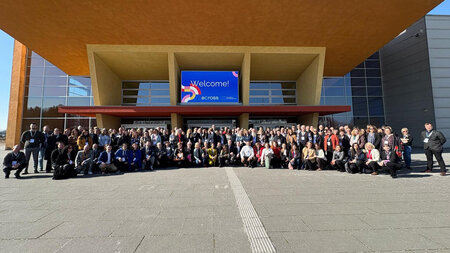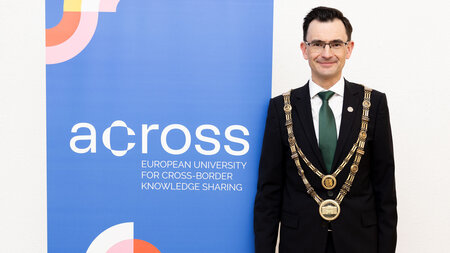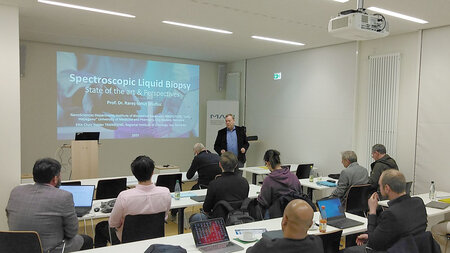Outstanding Results in “Internationalization”
TU Chemnitz improves its position in “Profile Data on the Internationality of German Universities” by HRK and DAAD – especially strong network with Asia
-

TU Chemnitz has had internationalization on their radar for many years. The university has 130 partner organizations on all continents around the world. Photo: IUZ/Sven Gleisberg
In matters of internationalization, Chemnitz University of Technology remains among the top-ranking technical universities nationwide. This was confirmed after publication of the 8th Profile Data Report on the Internationality of German Universities by the German Rectors’ Conference (HRK) and the German Academic Exchange Service (DAAD). According to the report, TU Chemnitz made improvements in multiple categories, including advancing from 3rd place to 2nd in the number of international students. Further examining the data according to which degree programs are being pursued, the TU also advanced from 3rd to 2nd place based on the number of master’s students enrolled. In students pursuing a bachelor’s degree, they climbed from 5th to 4th place.
The most recent Profile Data Report dedicates much more space to international networking. In addition to European ERASMUS Partnerships, TU Chemnitz is especially well-networked with Asia compared to other technical universities. Around 39 percent of all of its cooperation agreements are with universities on this continent.
“This newest report underscores once again that TU Chemnitz is an exceptionally globally-oriented university that is very well-connected on an international level,” says Prof. Dr. Gerd Strohmeier, President of TU Chemnitz. “As the university with the highest percentage of international students in Saxony, we feel a particular obligation to the pursuit of internationalization,” adds Prof. Dr. Maximilian Eibl, Vice President for Academic and International Affairs. TU Chemnitz already received very positive evaluations last year as part of the ongoing “Internationalization of Universities” Re-Audit conducted by the HRK. The Re-Audit will be completed in March 2020. “One central goal of the Re-Audit process is continuing to improve our international students’ academic success,” says Eibl. According to him, this is important for a number of reasons: “The TU’s international students, who have come to us from 100 countries, are an investment in the future. As high achievers in their home countries, they will later become good cooperation partners for industry and research in Saxony. At the same time, our German students and their international classmates can have their first real-world international experiences without having to leave Chemnitz.”
Background: “Profile Data on the Internationality of German Universities”
In 2009, a joint project to survey “Profile Data on the Internationality of German Universities” was commenced by the DAAD, the HRK and the Alexander von Humboldt Foundation (AvH). The goal of this project is to provide participating German universities with data on their own internationality as well as information about how they compare to other universities of the same type on an annual basis. For transparency, only data available from freely accessible sources is used, such as from the German Federal Statistical Office, the European Commission, the HRK´s Higher Education Compass or the DAAD’s or the AvH Foundation’s own statistics. The universities included in the published report are kept anonymous. However, an individualized report of the results is made available to each institution for review.
(Translation: Sarah Wilson)
Matthias Fejes
23.02.2018
- Naturwissenschaften
- , Mathematik
- , Maschinenbau
- , Elektrotechnik und Informationstechnik
- , Informatik
- , Wirtschaftswissenschaften
- , Philosophische Fakultät
- , Human- und Sozialwissenschaften
- , Universitätsrechenzentrum
- , Universitätsbibliothek
- , Zentrum für Lehrer*innenbildung und Bildungsforschung
- , Schüler
- , Studierende
- , International
- , Forschung
- , Wirtschaft
- , Absolventen
- , Freunde
- , Chemnitz





